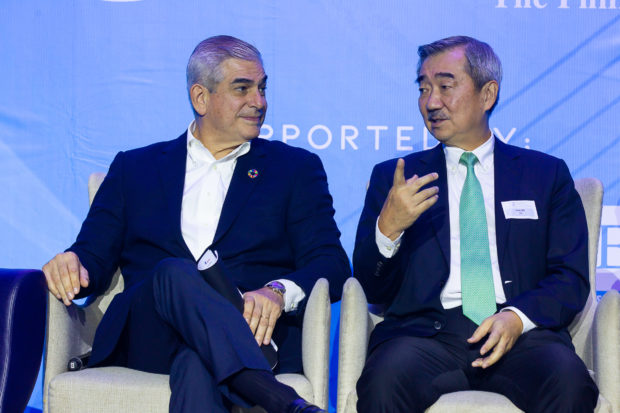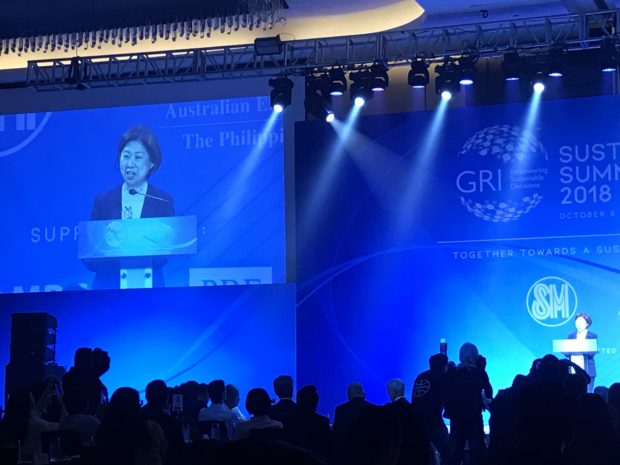Big firms adopt inclusive, sustainable business models

Jaime Augusto Zobel de Ayala and Hans Sy at the GRI Sustainability Summit 2018
From “impact” investing, building resilient infrastructure to fostering greater economic and social inclusivity, the country’s biggest corporations are aligning their core businesses to better respond to the needs of the people and the planet and not just in generating profits.
Teresita Sy-Coson, SM vice chair, said at the opening of the GRI Sustainability Summit 2018 on Monday that businesses were closely aligning their agenda with sustainability as they face greater unpredictability due to the devastating effects of climate change and the widening social and economic gap.
“As more and more businesses get together to pursue the objective of operating sustainably, there is a need for us to have common measures on how we are performing,” Sy-Coson said.
She said “impact investments”, or those that put sustainability elements into the equation, were critical. These impact investments give due importance to both financial and nonfinancial indicators from the time a project is conceived.
Sustainability considerations are also seen as vital in mitigating risks. “We at SM believe that when we view opportunities with the wider lens of assessing our role in environmental or social issues, it enables us to identify and better prepare for risks,” Sy-Coson said.
Article continues after this advertisementJaime Augusto Zobel de Ayala, chair and chief executive of the country’s oldest business house Ayala Corp., said: “As we evolved and adjusted our own business models to be far more inclusive in meeting the needs of a much broader consumer segment, we have identified three key challenges to operating within the base of the pyramid.”
Article continues after this advertisementFirst is the operational challenge, Zobel said, noting that there were implications of affordability and access during the initial entry into low-income consumer markets. For example, lower disposable incomes limit the amount of a product that can be purchased at any one time. This is why “parceling” or purchase-as-needed small amounts have become popular in emerging markets, he said.
Then there is the fundamental culture challenge as corporate decision-makers do not typically come from the base of the pyramid, making them a step removed from the realities on the ground, he added.
Zobel said another challenge was in improving the overall framework for doing business, with uncertainties in regulation and enforcement of policies increasing the complexity of developing inclusive businesses.
“From these experiences, the single most important take away from us is the need for businesses to be open to experimentation: To look at business models from a new and innovative perspective,” he said.
Through innovative and creative business models, Zobel said Ayala sought to achieve a balance between its financial aspirations and its broader sustainability and nation-building goals.
SM Prime, for its part, has committed to allocate 10 percent of its capital expenditures to incorporate disaster-resilient features in the design and construction of its property developments.
“As the public sector takes a lead role in regulatory and governance functions, the private sector can share the lead in adopting responsible and sustainable business practices. In particular, businesses should take a closer look at integrating disaster risk reduction into their business models and processes,” SM Prime chair Hans Sy said.

Teresita Sy-Coson opens the GRI Sustainability Summit 2018